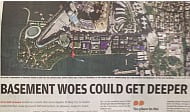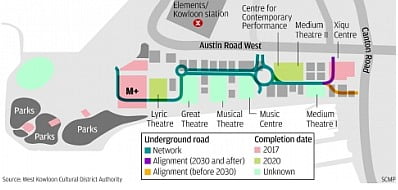Another day, another pro-Beijing ‘think tank’ determining that Hong Kong’s Occupy Central movement endangers the city’s economic competitiveness. Two suitably dorky-looking types – one from a Mainland academy, one from the Better HK Foundation – clutch the report and grimace, perhaps hoping that no-one will spot  how desperately unoriginal the whole thing is. (You can do your very own at home: list lots of cities in the Mainland and Taiwan plus Hong Kong as if they’re all one big happy comparable family; grudgingly put Hong Kong first with the warning that it’s slipping; say its economy is ‘too reliant’ on real estate without asking whether it’s actually the other way round and real estate’s role is parasitical; blather about ‘innovation’; warn that pro-democracy demonstrations will plunge us into the Third World.)
how desperately unoriginal the whole thing is. (You can do your very own at home: list lots of cities in the Mainland and Taiwan plus Hong Kong as if they’re all one big happy comparable family; grudgingly put Hong Kong first with the warning that it’s slipping; say its economy is ‘too reliant’ on real estate without asking whether it’s actually the other way round and real estate’s role is parasitical; blather about ‘innovation’; warn that pro-democracy demonstrations will plunge us into the Third World.)
These guys also, if you can really be bothered, insist that Hong Kong must participate in the ‘Hong Kong-Shenzhen Innovation Circle’. The few of us who were paying attention last heard of this in 2007 when it ‘achieved a milestone’ before fading into deserved and easily foreseen nothingness. Its attempted exhumation should set off the Grasping Vested Interest alarm bells.
Two funny stories on the aforementioned real estate market. In Mainland cities, developers are complaining because local officials won’t let them cut prices of new homes by more than 15% or 20%. The rule is “intended to avoid volatility in property prices that might result in social unrest,” which is quite touching. Meanwhile, up in sunny Tai Po, property sellers are averting social unrest by refusing to cut prices even though land values there have halved since 2007. The prices they paid for their units at Providence Bay, completed 2012-13, incorporated bloated land prices. The South China Morning Post is wrong to call these people ‘sellers’: they want to sell, but refuse to lose on the deal.
Just as patriotism seems to require Hong Kong to forever be threatened by falling competitiveness, and just as the overpricing of concrete boxes seems to warp people’s understanding of basic economics, so the West Kowloon Cultural Hub Zone Extravaganza Saga will remain a hugely controversial, perpetually unfinished, unwanted and unasked-for sprawl of multi-billion-dollar Xiqu Theatres and Centres for Contemporary Performance.
Although some observers find it incomprehensible, the project is really quite simple: it’s tons and tons and tons of concrete, with some trees to one side. To make way for the trees, loads more concrete has to be put underground. The cost of this has now gone up from a vast amount of money to a gargantuan one. Simple.
For some reason, calling it a ‘basement’ makes it sounds worse; I would have more sympathy for a multi-billion-dollar ‘humungous subterranean pleasure dome’. Among the reasons the SCMP cites for the ongoing mess are the splitting of work into phases, ‘separate clusters of venues’ and pressure from other infrastructure projects, leading to wild-eyed radicals who oppose the importation of labour.
Looking at the SCMP’s graphic…
 …it seems that the basement essentially accommodates a road running below ground level. Not just a road, but a mini-network incorporating two roundabouts and plentiful parking space for all those Alphards. And it suddenly dawns on you that this is the Hong Kong transport/planning bureaucracy at work. There’s already Austin Road West – essentially a pair of parallel two-lane roads – just 100 or so yards to the north, running east-west along (potentially providing vehicular access to) the entire arts hub complex. I bet that all the planners had to do was design private cars out of the project, and voila – you have a bunch of museums and theatres that mysteriously do not need their own dedicated highway system. But then, of course, the civil servants would have to sit in a smelly bus to see the Xiqu, and their buddies in the construction industry would make less profit. And ultimately, needless to say, it’s all the fault of the public for persistently and dementedly demanding that the project include those trees.
…it seems that the basement essentially accommodates a road running below ground level. Not just a road, but a mini-network incorporating two roundabouts and plentiful parking space for all those Alphards. And it suddenly dawns on you that this is the Hong Kong transport/planning bureaucracy at work. There’s already Austin Road West – essentially a pair of parallel two-lane roads – just 100 or so yards to the north, running east-west along (potentially providing vehicular access to) the entire arts hub complex. I bet that all the planners had to do was design private cars out of the project, and voila – you have a bunch of museums and theatres that mysteriously do not need their own dedicated highway system. But then, of course, the civil servants would have to sit in a smelly bus to see the Xiqu, and their buddies in the construction industry would make less profit. And ultimately, needless to say, it’s all the fault of the public for persistently and dementedly demanding that the project include those trees.
I declare the weekend open with the thought that it is not that cynics are more prone to dementia (as scientists who can’t tell cause and effect apart say), but that those of us who are most sensitive to the world’s awfulness are more likely to be driven crazy by it.

